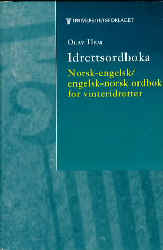|
| |
Winter Sports Dictionary
|
 |
Not least in connection with the big international sports events
communicated to us in various ways, we discover the enormous variety of special
terms that occur. Even in our own mother tongue we often need specialist help in
understanding the terminology used. In that English is the language most used in
the world of sports, it is highly important that dictionaries are available to
cover this need as far as possible. The biggest and most up-to-date dictionaries
on the market are doubtless very helpful. But their publishers have to pay so
much attention to all the other subjects a general dictionary is expected to
cover that they often have to limit their scope ruthlessly. One of a number of
problems I have encountered while working on this dictionary is that it is
difficult , and to some extent impossible, to distinguish between British and
American/Canadian English.. American words and expressions are becoming more and
more common in British English. This is most obvious in the area of sports, and
especially winter sports, in which the Americans play a far more prominent part
internationally than the British.
The source material on which I have based my work has been found in the
’international’ market on both sides of the Atlantic Ocean. All examples are
genuine in that they have occcured in sports reports in press, radio and
television or in technical works on the various branches of the sport. Once
again I have found that English in many repects has a far richer vocabulary than
Norwegian. In certain areas in which Norway has traditionally played a
relatively modets part, for example in figure skating, bobsleighing and lugeing,
it has often been impossible to find direct translations. Instead, I have done
my best to describe the concept or the activity, in the hope that this may meet
the need to some extent.
I am greatly indebted to the lexicographer Willy Kirkeby. Without his help and
encouragement, both in person and through his highly professional books, I
should never have been able to complete this project. In addition to the
dictionaries mentioned, other sources have been the language system specially
worked out for use at the Winter Olympics in Calgary in 1988 (English-French-German),
video recordings from Eurosport, reports in British and American periodicals and
newspapers, etc. I have no doubt that some readers will find omissions, weak
points and mistakes in this book. I shall be glad to accept constructive
criticism, in the hope that a possible later edition may be all the better.
Hamar, September 1995
Olav Hem
|